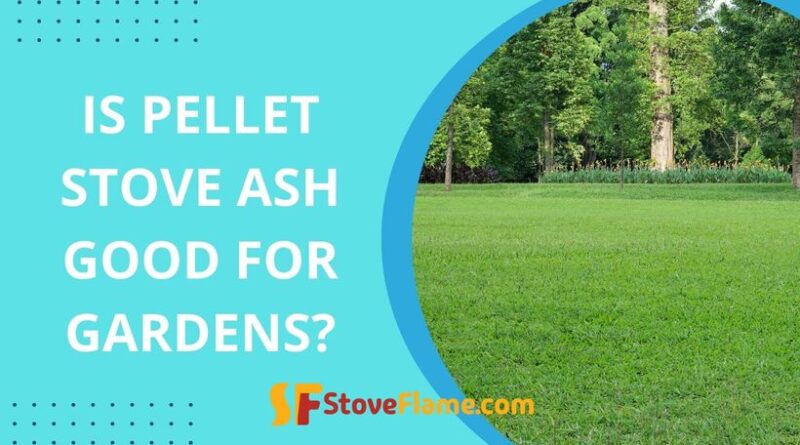Is Pellet Stove Ash Good For Gardens?
Pellet stoves have gained popularity in recent years as a cost-effective and environmentally friendly way to heat homes. These stoves burn compressed wood pellets, producing a high concentration of heat with minimal smoke and ash. However, the byproduct of this efficient heating method – pellet stove ash – often raises questions about its potential uses.
Among these inquiries is whether pellet stove ash can be beneficial to gardens. After all, with the increasing focus on sustainable practices and organic gardening, utilizing all available resources is crucial.
This article will analyze the characteristics of pellet stove ash and assess its viability as a natural fertilizer for gardens. Additionally, we will investigate any potential hazards or limitations related to the use of pellet stove ash in gardening.
Our objective is to offer an insightful response to the inquiry, “Is pellet stove ash beneficial for gardens?”, by considering a range of factors that could influence the efficacy and safety of incorporating this byproduct into your garden. Let us now delve into the realm of pellet stove ash and its prospective advantages for your garden.
Is Pellet Stove Ash Good For Gardens?
The application of pellet stove ash in gardens can offer several advantages in terms of soil fertility and plant health. The high concentration of nutrients like calcium and potassium in pellet stove ash can help enrich the soil and provide essential minerals for plant growth.
However, it is important to note that not all plants thrive in alkaline conditions, so it is crucial to evaluate the specific needs of your garden and the plants you are growing before using pellet stove ash as a soil amendment.
Conducting a soil test can provide valuable insights into the pH levels and nutrient requirements of your soil, allowing you to determine the appropriate amount of pellet stove ash to use.
Additionally, it is recommended to mix the ash with organic matter such as compost to improve its overall effectiveness and ensure a well-balanced soil composition. By understanding the needs of your plants and using pellet stove ash in moderation, you can harness its benefits and contribute to the health and vitality of your garden.
Exploring the Nutrient Content: What Does Pellet Stove Ash Provide?
When it comes to exploring the nutrient content of pellet stove ash, it’s important to understand the potential benefits it can offer to your garden. Pellet stove ash contains a range of essential nutrients such as phosphorus, magnesium, and trace elements like zinc and copper.
These nutrients can contribute to the overall fertility of the soil, promoting healthy plant growth and development.
Additionally, pellet stove ash has a high liming effect, which can help to raise the pH levels of acidic soils and create a more favorable environment for certain plants.
However, it’s important to note that the nutrient composition of pellet stove ash can vary depending on the type of wood used and the combustion process. Thus, it’s always a good idea to have your pellet stove ash tested for nutrient content before applying it to your garden. This will allow you to make informed decisions and ensure that the nutrients provided by the ash align with the needs of your plants.
pH Levels and Soil Amendments: How Does Ash Affect Garden Soil?
Wood ash from pellet stoves can have a significant impact on the pH levels of garden soil. Due to its high liming effect, ash can help neutralize acidic soils and bring them closer to a more optimal pH range for plant growth.
This is particularly beneficial for plants that thrive in slightly alkaline environments. However, it’s important to proceed with caution and monitor the pH levels closely after applying ash to the soil.
Excessive use of ash can lead to overly alkaline soil, which may negatively affect the growth and health of certain plants. It’s always a good idea to conduct regular soil tests and adjust the amount of ash accordingly to maintain a balanced pH level for your garden.
Guidelines for Using Pellet Stove Ash in Gardens
When using pellet stove ash in gardens, it’s crucial to follow some guidelines to ensure its safe and effective use. Firstly, only use ash from wood pellets made from clean, untreated wood. Avoid using ash from pellets containing chemicals or additives, as they can harm your plants.
Secondly, apply the ash in moderation. Start with a small amount and gradually increase if needed, while closely monitoring the pH levels of your soil. Remember, it’s easier to add more ash than to correct overly alkaline soil.
Lastly, avoid applying ash directly to the plants or seeds, as it can be too concentrated and potentially cause damage. Instead, spread a thin layer of ash evenly across the soil surface and gently rake it in.
By following these guidelines, you can safely harness the benefits of pellet stove ash for your garden.
Alternative Uses for Pellet Stove Ash in Gardening
One alternative use for pellet stove ash in gardening is as a natural fertilizer. Ash contains essential nutrients such as potassium and calcium, which can enhance soil fertility and promote healthy plant growth. Sprinkling a thin layer of ash around plants can provide them with these beneficial nutrients.
Another use is as a pest deterrent. Ash can act as a natural barrier against certain garden pests, such as slugs and snails, by creating an abrasive surface that they prefer to avoid.
Additionally, pellet stove ash can be used as a soil amendment to improve drainage and aeration, especially in clay soils. Mixing ash into the soil can help break up compacted areas and create a more favorable environment for plant roots. However, it is important to note that ash should be used sparingly and in moderation, taking into consideration the specific needs of your plants and soil conditions.
Expert Opinions: What Do Gardeners and Agriculturists Say About Using Pellet Stove Ash?
Gardeners and agriculturists have differing opinions when it comes to using pellet stove ash in gardens. Some experts suggest that using ash in moderation can be beneficial for certain plants, especially those that prefer alkaline soil conditions. They believe that the nutrients present in ash can contribute to improved plant health and enhanced growth. However, it is important to note that not all plants thrive in alkaline soil, so it is crucial to understand the specific needs of your plants before incorporating ash into your garden.
Other experts caution against using pellet stove ash, particularly if you have acidic soil or if the ash contains additives or chemicals that may be harmful to plants.
They recommend testing the pH levels of your soil and conducting thorough research before using ash as a soil amendment. Ultimately, it is advisable to consult with local gardening experts or agricultural extension offices to obtain personalized recommendations based on your specific gardening conditions and plant types.
Wrap Up
In conclusion, while pellet stove ash may seem like a great addition to your garden, it’s important to use it in moderation and with caution. Too much ash can alter the pH balance of your soil and potentially harm your plants. However, when used correctly, pellet stove ash can provide valuable nutrients and improve soil texture.
It’s always best to conduct a soil test and consult with a gardening expert before adding any new amendments to your garden. With proper care and knowledge, pellet stove ash can be a beneficial addition to your gardening routine.
I'm Daniel Miller, the proud owner of StoveFlame. With over five years of experience in this dynamic field, I've honed my skills and passion for delivering top-notch quality and accuracy in everything I do.





